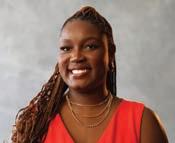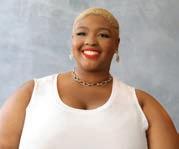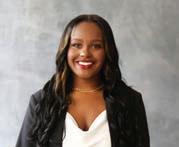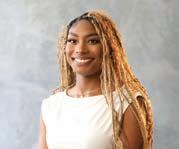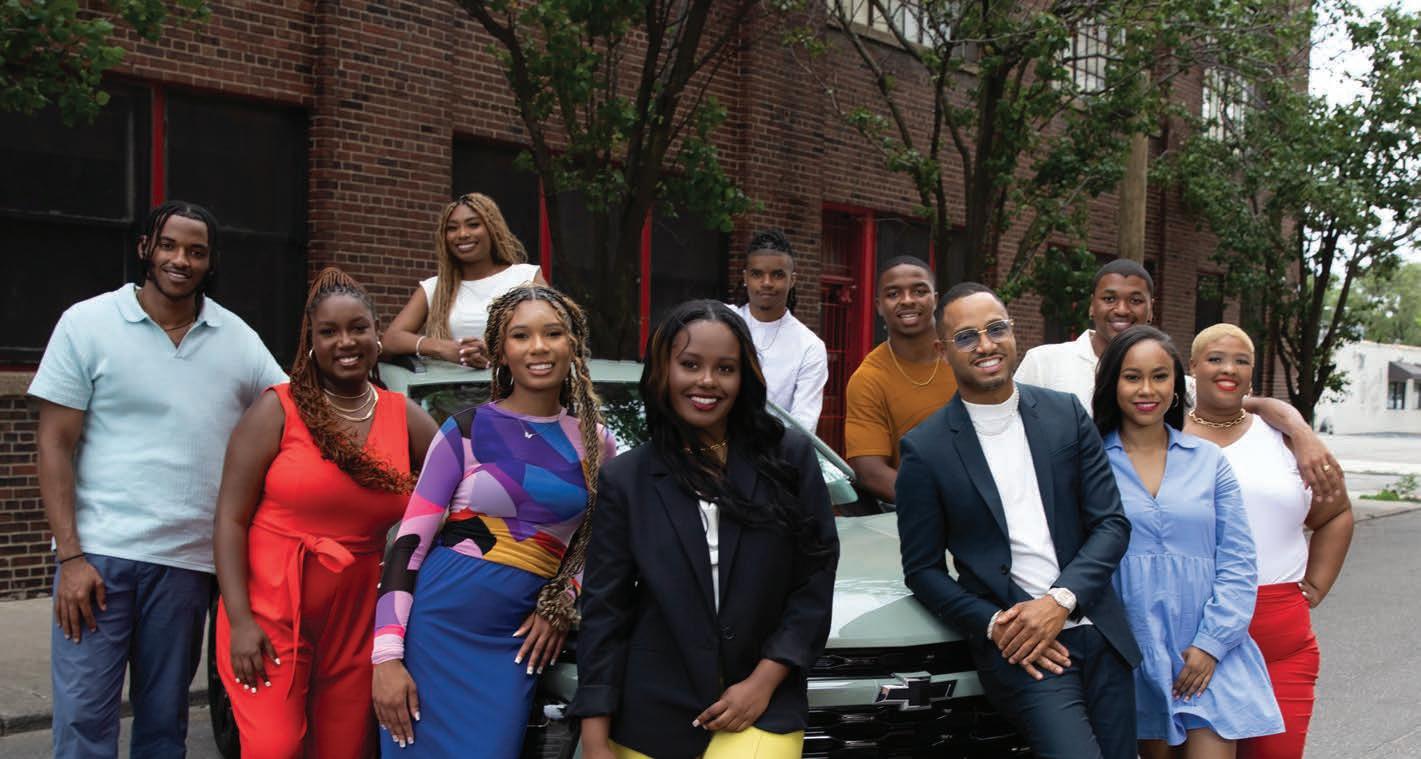




BY LENTHEUS CHANEY
Editor’s Note: September is National Suicide Prevention Month and The Atlanta Voice will feature stories of Black suicide survival and education. This is the first in what we hope can be a series of stories.
D. Suggs
Elaine Mayfield lost her husband, Marcus Mayfield, a United States Air Force veteran, to suicide one year ago. Elaine is now trying to adjust to life without him and discover her new normal.
When Elaine thought back on the day of Marcus's death, she remembered seeing minute indicators across years. Elaine recalled noticing subtle signs over the years. "Marcus was very likable, very friendly, and always willing to help,” she remembered. “But over time, I noticed he was easily agitated and very sensitive about any failures."
It wasn't until after learning about Marcus's first suicide attempt, years before they met, that she became vigilant about his emotional cues. "He told me that suicide felt like an addiction," Elaine said. "He had described it as a way out when things got hard."
According to the National Institute of Mental Health's website, women are more likely to receive mental health treatment than men, and men are more likely to die by suicide than women. Black boys and men account for 81% of suicide amongst Black Americans, according to data from the Center for Disease Control (CDC).
Elaine said the days leading up to Marcus's death, which took place in his truck, were tumultuous, marked by arguments and misunderstandings about their future. "We had just moved into a new apartment [in Marietta after selling their home in South Fulton], and I started training for a new job," Elaine said. "The stress levels were high for both of us."
Marcus's death doubled Elaine's responsibilities in an instant. She had to balance her grief while making decisions about his funeral, running their small business, the couple owned an event space and an AirBnB property, taking care of her son, and managing her day-to-day life. “I had to quickly take care of all the necessary arrangements, and it felt like I couldn't even mourn properly,” she said.
Elaine's journey through grief also involved a series of emotional reckonings, not only with Marcus but with herself. "I was angry with him, and I blamed myself for not doing enough," she admits. Con -

versations with Marcus's family helped her find solace. "His stepdad told me that Marcus had been dealing with these issues for a long time and that if it hadn't happened now, it could have happened later."
Looking back at how she has handled this significant loss, Elaine realized she needed to change how she processed her grief. "For a long time, I held onto anger and didn't fully mourn," she said. "You need people who will just listen without judgment or trying to fix things. Sometimes, all you need is an ear."
Elaine wants people to recognize when others are having a hard time coping. "Look for the signs, and if you feel someone close to you is struggling, try to help them find the support they need," she said. "Listen to your loved ones, be vigilant about the signs, and most importantly, try to provide a supportive and nonjudgmental space."
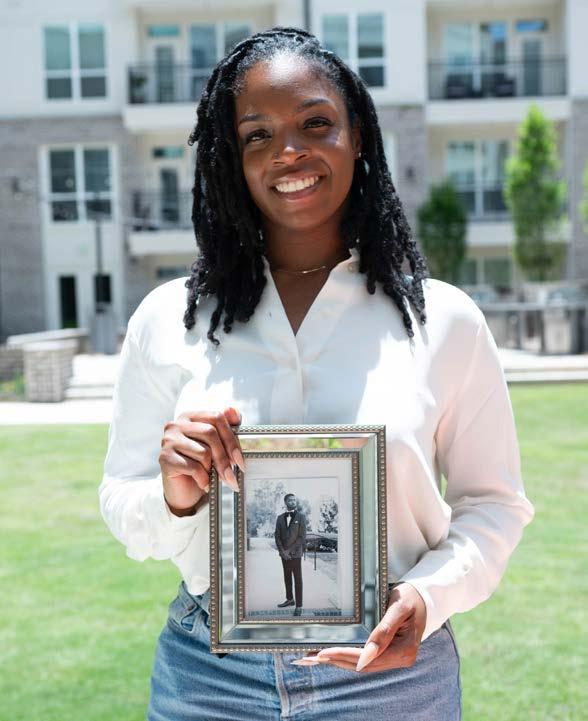
According to the National Institute of Mental Health’s website, women are more likely to receive mental health treatment than men, and men are more likely to die by suicide than women.
BY DONNELL SUGGS
The interior of Wood Chapel BBQ in Summerhill was a bit different than it would normally be on a Friday night. Blue “Harris Walz” signs took up wall space next to red “Stop Trump’s Abortion Ban” signs. The restaurant was packed as usual, but on that afternoon it was supporters of the Democratic presidential Harris-Walz ticket that filled the wooden picnic tables. They were there to see and hear popular political figures such as Georgia Senator Jon Ossoff, Congresswoman Nikema Williams, and State Rep. Shea Roberts (District 52), and former Atlanta Mayor Keisha Lance Bottoms speak as part of that day’s “Fighting for Reproductive Freedom” bus tour, but it was a former television star that stole the show.
Glenda A. Hatchett, more commonly known as “Judge Hatchett” from her many seasons as a television star and TV judge, still practices law in Atlanta as a trial attorney with Stewart Miller Simmons, but on Friday afternoon she took the stage as a grandmother. Hatchett and her son, Charles Johnson IV, lost Kira Dixon Johnson, her daughter-in-law, during childbirth in 2016. Though not necessarily a reproductive issue, Dixon’s death during what should have been one of the greatest moments of that family’s life, is parallel to what happens when women aren’t heard.
“This is the first time I’ve told this story on the campaign trail,” Hatchett told The Atlanta Voice after she left the stage.
Hatchett and her son have made several television appearances and talked to several publications about their family’s loss, but the political sphere is new to her. A major pillar of United States Vice President Kamala Harris’ and Minnesota Governor Tim Walz’s presidential campaign are reproductive rights and Hatchett’s testimony about Kira’s unfortunate passing is something the Harris-Walz campaign might want to make a feature, at least in Georgia, going forward.
Hatchett wore a white jacket with words and phrases on it like “Empowered,” “Vote”, “Let Your Voice be Heard,” and “Democracy,” as she walked over to speak. She was roundly applauded after being announced to speak, saying it was a “privilege and responsibility to be here” and that voters didn’t do what they needed to do in 2016 and “because we didn’t do what we needed to do in 2016” the country saw three Supreme Court Justices help get Roe v. Wade overturned after decades in the books.
“Had that not happened we wouldn’t be talking about the overturning of Roe v. Wade,” Hatchett reiterated.
Moments later she shared her family’s story of loss and you could hear a pin drop in what was minutes earlier filled with loud, en-
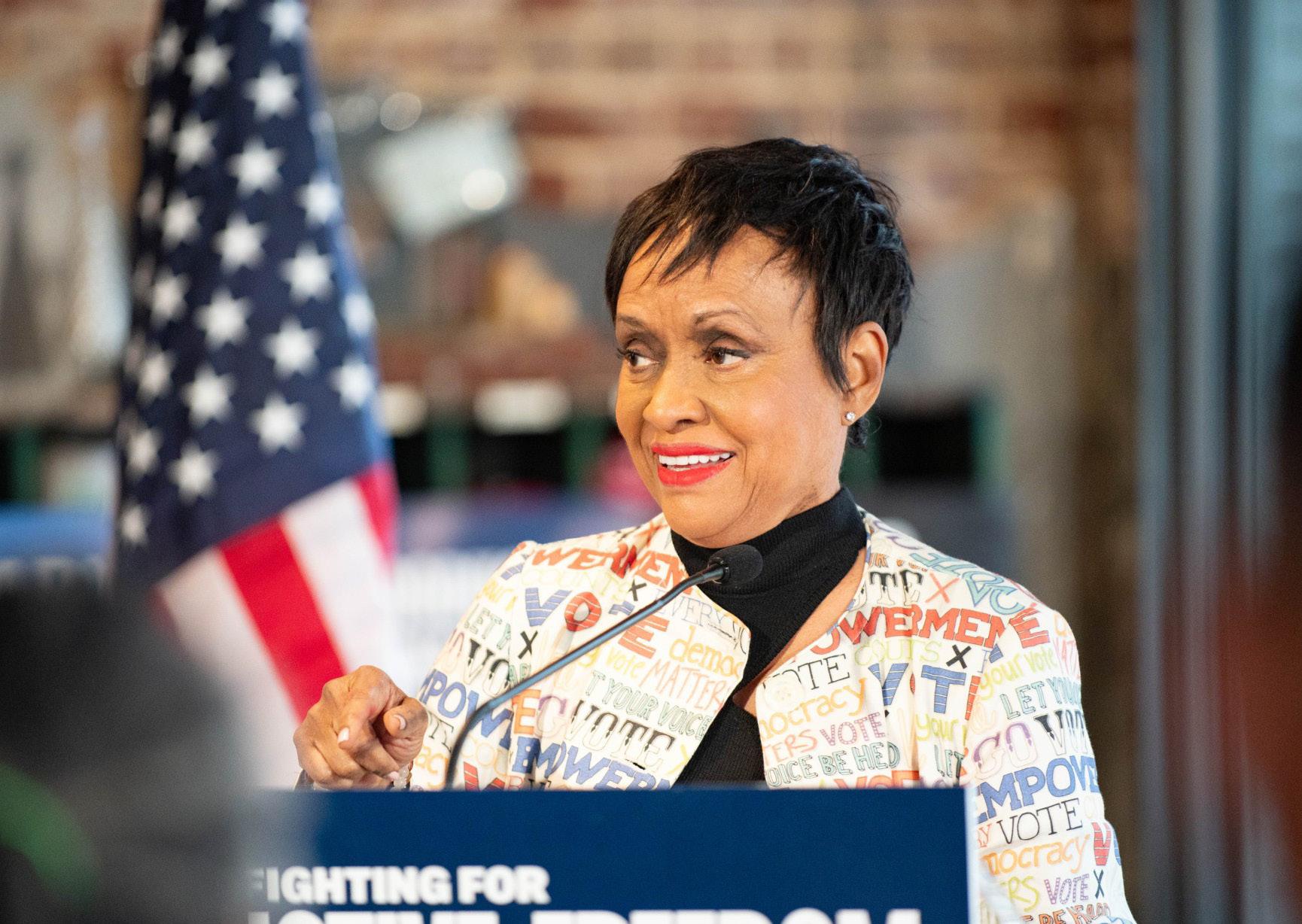
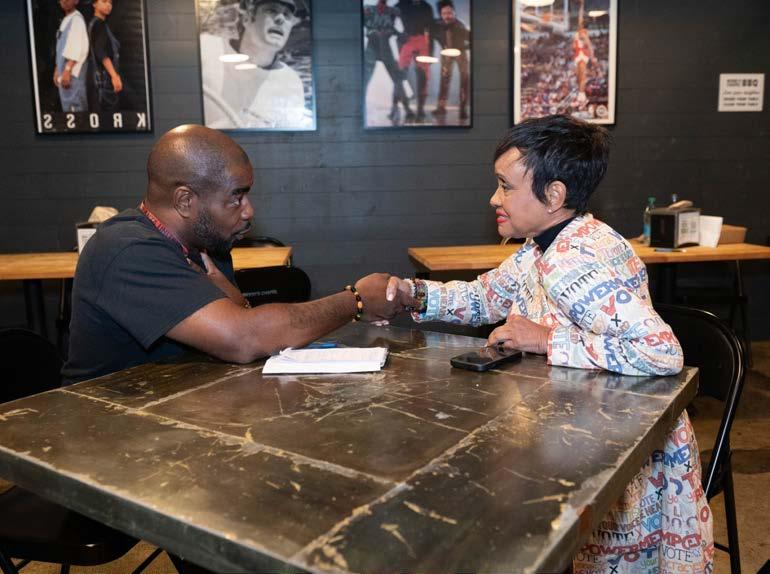
ergetic supporters. The silence in the room said a lot about how a story of such tragic loss affects anyone that hears it. Roberts, a wife and mother, also shared her story of
having to have an abortion at the age of 37.
“I have absolutely no doubt in my mind that it was the best decision for myself, my family, and my unborn child,” Roberts, who
is an outspoken supporter of reproductive rights, said.
Asked if she was open to sharing her story on the campaign again, Hatchett said she was open to doing that.
“This is not a story that I am shy about telling,” she said.
Two of the people inside Wood Chapel BBQ that were listening, Marnita Lawrence, a Douglas County resident, and Opal Williams, a Fulton County resident and independent, both listed social security, Medicare, and the economy as issues that are at the top of their lists this election season. That said, both were captivated by Hatchett’s story. During the telling, each were speechless, similar to what looked like every other person in the room that wasn’t either crying or physically wiping away tears.
“I vote for my interests and the interests of my family,” Williams said.
“I think there’s momentum going, but hopefully that translates into votes,” Lawrence said.
Ossoff added that the coming presidential election is about more than party choice. “It’s not about Democrats v. Republicans,” Ossoff said. “It’s about real women’s lives.”
“Have a vision of excellence, a dream of success, and work like hell.”— Dr. Samuel DuBois Cook

We’re experiencing the best Black economy in generations, but if the status quo remains, it’ll take 800 years to close the racial wealth gap. Photo Credit: iStock.com/PixlesEffect
BY ALGERNON AUSTIN AND DEDRICK ASANTE-MUHAMMAD
As the country moves rapidly toward our 2024 presidential election, Black Americans are experiencing the most positive economic conditions in generations.
Record low unemployment rates, record low poverty rates, record high-income levels, and new heights of wealth paint a picture of prosperity. One could easily think that this data means Black people are experiencing broad prosperity. Yet, deeper investigation reveals that despite these record-breaking economic numbers, Black Americans are still mired in great economic insecurity. This ongoing economic challenge is reflected in their low opinion of the economy, widespread asset poverty, and ongoing Black/white economic inequality.
The best Black economy in generations isn’t enough when near-never-ending inequality and insecurity loom on the horizon. As the nation goes through a historic election that could have longterm ramifications on its political direction, it is clear that for Black voters, economic concerns remain front and center, even as social issues dominate the headlines.
From 1972 to 2022, the average annual Black unemployment rate was 11.6%. In July of 2024, it was at 6.3%, nearing historic lows. But those figures look different in context; in 2023, for instance, the annual Black unemployment rate was nearly 1.7 times the white rate. On average, the Black unemployment rate between 1972 and 2022 was
2.1 times that of whites, showing that bridging the Black/white unemployment gap remains a work in progress.
Other indicators tell us a similar story. The annual Black prime-age employment rate is at a record high: For the first half of 2024, it has averaged 78%, slightly above where it stood the previous year. Black median household income is also at its highest point in a generation, growing from about $41,000 in 2011 to nearly $53,000 in 2022 — a nearly 30%increase. That same year, median Black wealth or net worth (assets minus debts) also reached a new high of nearly $45,000, more than double the post-Great Recession low of about $17,000 seen in 2013.
Despite these positive trends, the economic reality for many African Americans remains precarious. In 2023, there would have needed to be over 1.4 million more Black people working to reach the same employment rates as white people. This joblessness cost Black America roughly $60 billion. And while Black median income has risen, it is still nearly $30,000 lower than the white median — and still even below the white median income of 1972.
The average Black median wealth of approximately $45,000 keeps a large majority of Black people distant from the $190,000 to $570,000 estimated as the wealth necessary to reach middle-class status. As noted in the 2023 report “Still A Dream,” with all of the advances made since 1960, the nation is still moving at a glacial pace in bridging Black/white economic inequality. If the country continues at the rate it has been moving since about the 1960s, it will take over 500 years to bridge Black/white income inequality, and nearly
800 years to bridge Black/white wealth inequality.
These statistics underline a crucial point: while Black Americans are experiencing significant economic gains, these advances are insufficient to overcome the entrenched inequalities that persist. The economic progress we see today is a foundation, not a finish line. It speaks to the need for comprehensive policies that address ongoing barriers to economic security and wealth-building. Investment in quality education, access to affordable healthcare, affordable housing, job creation targeted to high-unemployment communities, and new means of government financing of asset-building opportunities like Baby Bonds are essential. These measures can help ensure that the economic gains of today translate into sustained prosperity and security for future generations. As we approach the 2024 presidential election, much has been made of the historic possibility of electing the nation’s first woman president. But let us not make this election a mere contest between individuals, but one of policies that could be a salve for the foundational wound of race and economic inequality. Addressing these issues with urgency and commitment will not only improve the economic outlook for Black Americans but also create a new foundation of great equality, creating a firm base for a more unified nation.
Algernon Austin is the director of Race and Economic Justice at the Center for Economic and Policy Research. Dedrick Asante-Muhammad is the president of the Joint Center for Political and Economic Studies.
FOUNDED May 11, 1966 FOUNDER/EDITOR
Ed Clayton Immortalis Memoria
PUBLISHER/EDITOR
J. Lowell Ware
Immortalis Memoria
The Atlanta Voice honors the life of J. Lowell Ware.
PUBLISHER
Janis Ware
PRESIDENT/
GENERAL MANAGER
James A. Washington 2018-2024
EXECUTIVE ASSISTANT TO PUBLISHER
Chia Suggs csuggs@theatlantavoice.com
EDITOR IN CHIEF Donnell Suggs editor@theatlantavoice.com
GENERAL ASSIGNMENT REPORTERS
Isaiah Singleton isingleton@theatlantavoice.com
Laura Nwogu lnwogu@theatlantavoice.com
EDITOR AT LARGE Stan Washington swashington@theatlantavoice.com
MANAGING EDITOR, DIGITAL Itoro Umontuen iumontuen@theatlantavoice.com
ADVERTISING, SALES & CIRCULATION
ADVERTISING ADMINISTRATOR
Chia Suggs advertising@theatlantavoice.com
CIRCULATION MANAGER
Terry Milliner
SALES
R.D.W. Jackson rdwadman@gmail.com
SUBMISSIONS editor@theatlantavoice.com
DIRECTOR OF PUBLIC RELATIONS
Martel Sharpe msharpe@theatlantavoice.com
CONTACT INFORMATION
633 Pryor Street, S.W. Atlanta, GA 30312 Office: 404-524-6426 info@theatlantavoice.com


BY JAMES A. WASHINGTON The Atlanta Voice
As someone who struggles with truth every day, I’ve come to understand that faith changes facts. Minister after minister and other individuals have drilled in me that man’s reality, and God’s reality is distinctly different. Man’s reality is based on his or her five senses: sight, smell, hearing, taste, and touch. Given any one of these senses, we perceive things as real. God’s reality is based on power, presence, and knowledge (universal truth). He is omnipotent, omnipresent and omniscient. That’s why I believe we have such difficulty, at times, embracing the concept of faith because we cannot see or touch it. Or can we? Faith, in my humble opinion, is very real and very discernable. Talk to anyone who has experienced God’s power or presence in their lives, and I’ll guarantee you that they know that faith is the essential ingredient of their new reality. Now they know that their former facts do not come close to the facts they can now see, hear, and feel. Someone was diagnosed and told they
Whether you possess the faith necessary to access the power of God is only known by God
would die soon. They didn’t. You saw no way out of a financial emergency but got out. Life was simply impossible, but now it’s manageable. The facts, your facts said you couldn’t. God said you could. The difference between the possible and the impossible is now a factor of faith.
As long as you operate in the realm of man, you are limited by the facts of man. We have proof of this daily. We are limited by our means. Our senses limit our means. Some people’s means are merely greater than others. That’s why we generally accept the edict that those with money can do and accomplish more than those without. Faith demands that we accept that all things are possible through Christ, who is Lord. The key to faith is we must let go and let God. As long as we hold on to what we control, we can only accomplish what
“YOUR VOICE”
our five senses tell us we can. Until we let faith put our condition or our situation into the hands of Him, who knows no limits, we will never achieve beyond our condition or situation. Sweat equity is one thing. Spiritual equity is another. Whether you possess the faith necessary to access the power of God is only known by God. The Bible is full of examples that depict God’s power only after a person has submitted totally to the will of God. Can you spell A-b-r-a-ha-m? All I’m trying to say is that faith changes facts. I can testify that my life is a wreck when left to my own devices and abilities. To my amazement, when given over to God’s wonder, my life is a miracle. Without God’s blessings, my life is a mess. With just a little faith, I can see incredible possibilities. And the possibilities have no limits.
“Have faith in God.‘Jesus answered.’ I tell you the truth, if anyone says to this mountain, ‘Go, throw yourself into the sea’, and does not doubt in his heart but believes that what he says will happen, it will be done for him. Therefore, I tell you, whatever you ask for in prayer, believe that you have received it, and it will be yours.” Mark 11:22-24.
Boy, where is your faith? Can you do this? Do you believe? I recognize these are not easy questions to ask or answer. But I believe there is a mustard seed out there somewhere. Prayerfully, it can take root in my soul and yours as we attempt to use faith to change the world’s facts.
May God bless and keep you always.

This column is from James Washington’s Spiritually Speaking: Reflections for and from a New Christian. You can purchase this enlightening book on Amazon and start your journey toward spiritual enlightenment.
In the wake of what happened at Apalachee High School, what do you want to see the politicians do about the shootings in the public schools of Georgia?

NOLAN PETERS Stone Mountain
“What I would like to see politicians do when it comes to school shootings is, primarily, I want to see them stop pushing the narrative that guns are the issue when it comes to these shootings. I want to see them stop trying to sensitize people to hate guns or even like guns if you're on the other end… so I want to see them stop pushing the narrative that guns are the issue. Maybe the issue with the school shootings is more mental or more of an inability of the parents or the owner of the guns to protect them and keep them secure. But the idea of just having the gun is the issue, or the gun epidemic is a problem in the country. I would like to see them stop. Stop doing that."
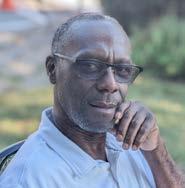
HUBERT WILSON
Stone Mountain
"A gun is a tool. You can't be mad and blame the tool. Stupid people do stupid things with tools. So, you can't hold everybody responsible. First, the system focuses on brute force. You have police all over the place and all kinds of stuff. So, kids and school children imitate what they are bombarded with. So, if you want a change, you must change from the top down, not the bottom up. And that's the bull that I can't understand. And then they want to blame it on guns. Guns do nothing. If you put a million guns on the ground, they aren’t going to do anything. They aren't going to get up and run to shoot nobody. Stupid people shoot people. Guns don't do anything."
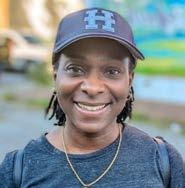
South Fulton
"I would like to see if the politicians, particularly the Republicans, have legislation that puts human life at the forefront. You can have a right to bear arms, but assault rifles are not necessary to do so if they have more legislation where it makes it harder to get guns. If assault rifles weren't banned, and those who had assault rifles were required to get insurance, then maybe they would think better about how they use those weapons, and there would be some responsibility, or it would... make people think about how they use them. But assault rifles should be banned. They're not necessary to protect yourself. That's not the right to bear arms to have an assault rifle. That's military style. They should enact that legislation to make sure that civilians stay safe. We're not living in a military environment going to school, and that additional legislation, as well as banning assault rifles, would not infringe on people's right to bear arms."
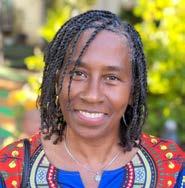
"One of the things that I would like to see the politicians take away from the school shootings in Georgia is that they figure out where these young people are getting these guns. First, I feel that guns have been a major issue with the shootings that are in Georgia. If guns are illegal at a certain age, where are they coming from? ... People are planting the guns in the neighborhood, and somehow, the young people are, for whatever reason, getting the money to purchase the guns to go and shoot up individuals that may not agree with or someone that might have wronged them. That is the wrong way to go about rectifying the issue... That's all I have to say."
Compiled by Vincent Christie
BY LAURA NWOGU
The first Black-woman-owned culinary academy in the Southeast has opened in DeKalb County. Located at 1927 Lakeside Parkway in Tucker, the Culinary and Hospitality Enthusiast of the Future Academy (C.H.E.F.) celebrated its grand opening on Thursday and has grown from a summer community program into an incubator and education space to help build the hospitality careers of young people and entrepreneurs.
Founded by chef Simone Byron and hospitality leader and business owner Adeola Sokunbi, the C.H.E.F Academy is an extension of the nonprofit organization Navigate Foundation, which Byron founded in 2017. Navigate is a hospitality workforce development initiative that aims to empower youth from underrepresented communities to become the next generation of chefs. Since its inception, 200 students have graduated from the program.
They hope to replicate much of the essence of Navigate Foundation in the C.H.E.F Academy. But while a big focus is ushering young adults into the hospitality industry, the C.H.E.F Academy also hopes to reach people of all ages and backgrounds, from those who want to take a mixology class to creatives looking for filming locations.
But the root of it all: curating classes that foster community
“We have people that are training and doing classes pertaining to certain skills. We’re doing pasta-making classes. We're doing pairing classes. There are classes for young people that are interested in baking a pastry in an after-school standpoint, where they can come in and do classes and earn certifications,” Byron said. “Working with the ACF [American Culinary Foundation] to provide a space for those certification programs to happen, which is really important for us.”
Many passions within the hospitality and restaurant industry stem from tradition, often passed down by family members and nurtured in the home. For Sokubi and Byron, it’s no different. And opening a first-ofits-kid culinary academy in a region whose foodways carry the industry, as two Black women, is not lost on them.
Sokunbi said the opportunity to open this academy is not only personal but cultural.
“To have that thought of, the first Black woman-owned in the Southeast, I just think
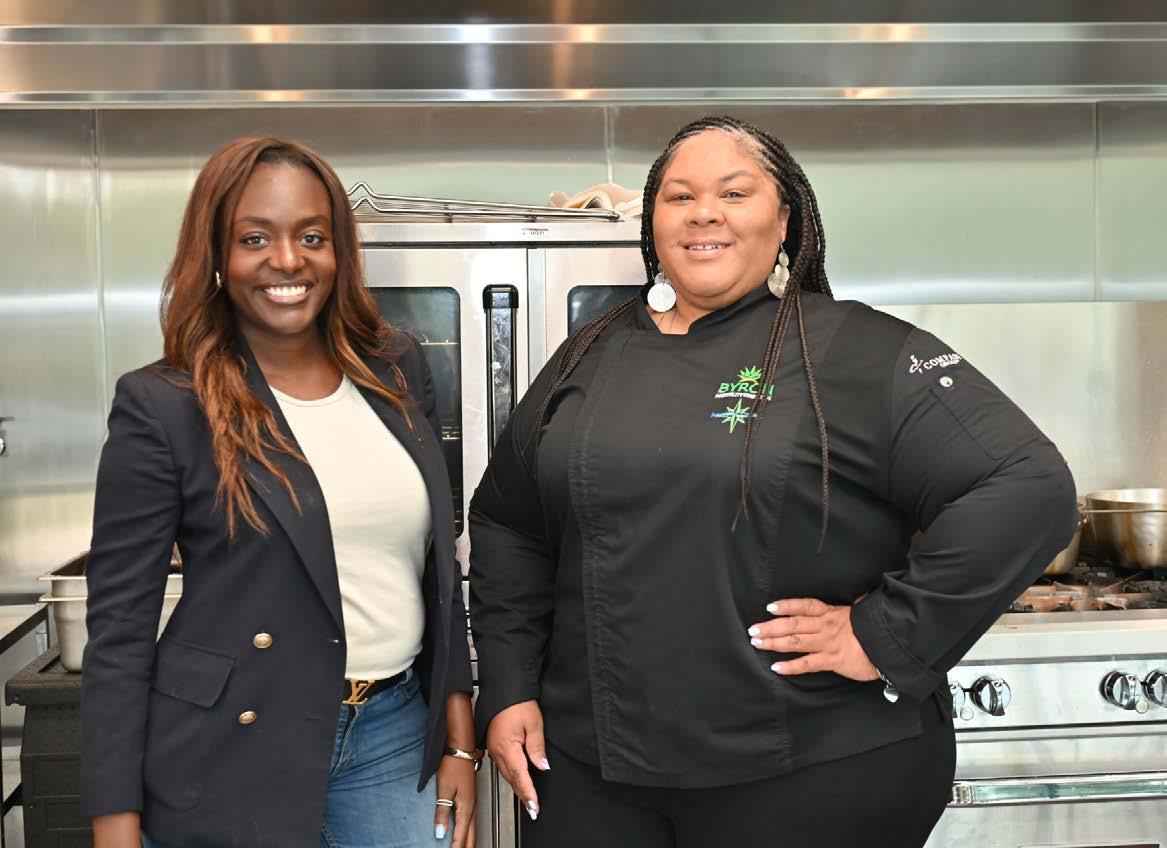

about all the strong women in my family. My grandmother was a cook,” Sokunbi said. “I think the biggest thing within the hos-
pitality space is that if you ask anyone you know who taught you how to cook, a lot of times they say it's their mother, their grand-
mother. But oftentimes they're not the ones that are necessarily making waves when it comes from an industry standpoint, and so to be that example is important.”
As a chef who comes from a generation of cooks, the academy is more than a title for Byron; it’s a mission.
“For me, this is a family legacy. My great-grandfather was the executive chef for the Black Star Line, Marcus Garvey’s ship. Our whole family is geared and based in hospitality, so for me to be in the industry since 17 and moved through several large organizations, and be doing this as an individual, it means a lot to me holistically.
“This is not necessarily a graduation; this is a birthing of something that we don't expect to just be in this space. What this will serve in several communities to come is very inspiring for me."
To learn more information on ways to get involved with C.H.E.F Academy, visit The Navigate Foundation at thenavigateprogram.org

BY DENNIS MALCOLM BYRON AKA ALE SHARPTON
When you think of JEEP, it’s virtually guaranteed that ruggedness, all-terrain capability, and being an iconic SUV maker collectively come to mind. Those perceptions continue to be implemented in 2024’s Compass, which is slightly larger than a typical compact SUV, yet has the advantages of a smaller platform compared to its big brother, the Cherokee. Presented in eight trims including the reviewed Latitude 4x4 here, JEEP provides enough choices to customize your desired experience.
The Latitude has a solid appearance delivered in white, boasting halogen fog lights, black roof rails, and deep-tint sunscreen glass; the “Altitude Special Edition” includes the 18inch gloss-black wheels which play well with the optional dual-tone combo.
Under the hood, the 2.0-liter I4 DOHC turbo engine is responsive, flexing 200-horsepower, 221 LB-FT of torque, and 2,000-pound towing capacity, conducted by an eight-speed automatic transmission, all-wheel drive, and

signature Selec-Terrain System to maneuver through whatever physical challenges journeys are in store.
Inside, the black interior includes cloth-vinyl bucket seats that are cushy, an adequately roomy cabin, plus a steering wheel and shift knob wrapped in leather. The black piano accents (also from the Altitude package) provide a nice touch of elegance as well. The driver will appreciate the Uconnect 5 infotainment system, vibrant 10.1-inch touch screen, seven-inch digital instrument cluster, and
physical controls that are ideal for quick adjustments of especially volume and temperatures. On the tech side, there is Apple CarPlay/ Google Android Auto capability, a ParkView rear back up camera, Wi-Fi, Bluetooth, a decent six-speaker sound system, voice recognition, and three USB ports so everyone is happy. The Convenience Group package ($2,675) was also featured and a welcomed upgrade; both the front seats and steering wheel get heat, remote start, additional USB ports, dual-zone climate control, a hands-free power
liftgate, and an auto-dimming rearview mirror to name most of the perks.
When taking on Mother Nature, safety is always a concern, and JEEP is generous with mindful applications. There is a plethora of strategically placed airbags throughout, lanekeep assist, adaptive cruise control, multiple motion detections, an auto-dimming rearview mirror, speed-sensitive power locks, performance disc brakes, and electronic stability control to help ease the mind. The five-year, 60,000-mile powertrain warranty also builds confidence when doing what JEEP is asking for—taking on virtually any ground variation with no fear.
For the price starting at $30K, the Compass Latitude’s long list of standard features, adequate gas consumption averaging 27 miles combined, and well-appointed off-road capacity, this compact SUV is worth consideration for the adventurous.
Fuel Economy: 24 city/32 highway/27 combined
Price: Starting at $30,170 which includes numerous features coming standard, the Altitude Special Edition ($1,896), Convenience Group ($2,675), and destination charge peaks at $36,335.
For more information, visit Jeep.com.


Project 2025 is Donald Trump and JD Vance’s plan to remake the federal government if they win. It would:
Use Civil Rights-era laws created to address discrimination to instead benefit white people – Axios, 4/1/24
Gut the Affordable Care Act, which will raise health care costs and threaten health care coverage for millions of Americans – AP News, 11/27/23
Cut Social Security and Medicare Americans have earned – Washington Post, 2/9/23
Ban abortion nationally – New York Times, 2/16/24


BY DONNELL SUGGS
Philadelphia – The first ever debate between current United States Vice President and Democratic presidential nominee Kamala Harris and former United States President and current Republican presidential nominee Donald Trump, which took place inside the National Constitution Center, ended in what boxing enthusiasts would call a technical knockout (TKO). Harris didn’t totally knock Trump out of the ‘Race for the White House, the tag line that debate host network ABC used for the night, but she won the political fight on this night.
What better place to make boxing references than in the hometown of Joe Frazier, Bernard Hopkins, and Rocky Balboa.
Despite this being Trump’s seventh presidential debate (in his third presidential bid), both as president and a presidential candidate, he seemed focused more on himself and saying that Harris was lying than the issues at hand. He mentioned United States President Joseph R. Biden several times despite never being asked about the President.
Harris won this crucial debate because she was focused on the questions that were asked and the answers that she gave. Trump was often distracted, like the time he mentioned illegal immigrants in Springfield, Ohio eating resident’s pets when the topic was something entirely different.
The debate was moderated by David Muir (anchor and managing editor of "World News Tonight”) and Linsey Davis (ABC News Live “Prime” anchor). Muir called the debate, which did not have a crowd or pre-written notes onsite, “an intimate setting for two candidates that have never met.”
Upon meeting on stage, Harris walked over to Trump and the two exchanged a handshake. Harris took that opportunity to verbally introduce herself. It was a moment of gamesmanship that felt like it broke the ice.
“I created one of the greatest economies in the history of this country, and I’ll do it again,” said Trump. Harris rebutted by saying Trump left the country in a mess and that she and United States President Joseph R. Biden during their administration cleaned up his mess.
Harris took an opportunity to try to tie a second Trump presidency to Project 2025. Trump once again denied knowing anything or being associated with Project 2025.
“I’m an open book, everybody knows what I am going to do,” Trump said.
“Donald Trump has no plan for you,” Harris said.
There were moments of name-calling from Trump, such as when he called Harris a “Marxist” and said that her father is a “Marxist professor.”
When the topic of reproductive rights was broached by Davis, Trump was asked first
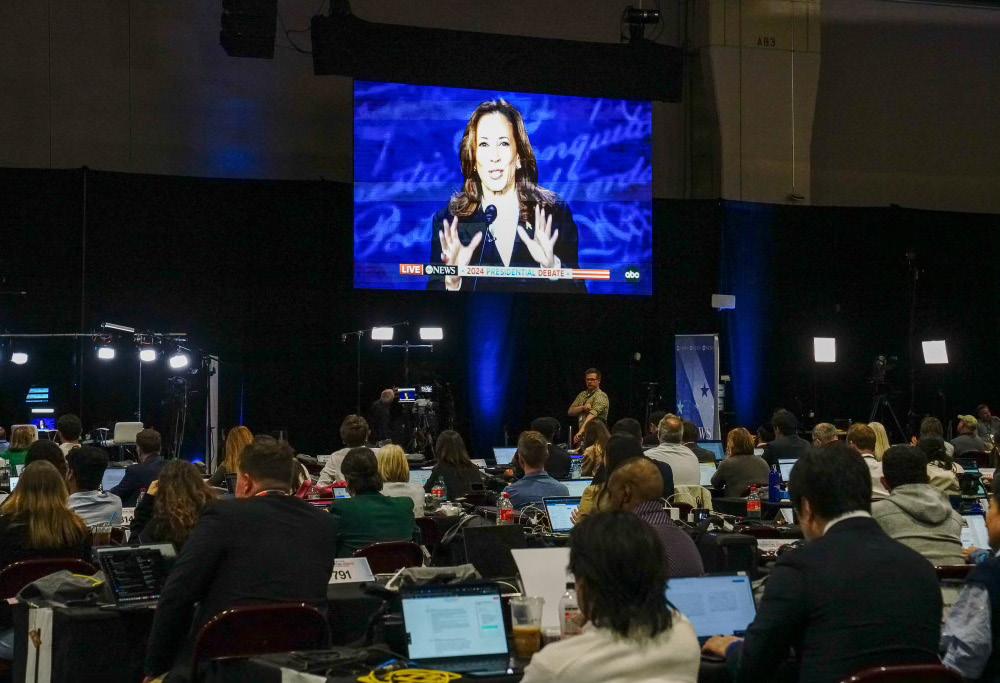

why voters should trust him when it comes to abortion? He touted getting Roe v Wade off of the books with the help of six Supreme Court Justices that he called brave and geniuses.
“And now states are voting on it,” Trump said about abortion, “It’s the vote of the people now.”
Harris, who said she supports the reinstatement of Roe v Wade, was measured throughout the debate and only once engaged Trump when it wasn’t her turn to speak. She found a way to mention that the former President was arraigned on 34 felony counts without making it sound like a dig at Trump.
“Frankly, the American people are exhausted by this tired old playbook,” Harris said of Trump’s tactics.
Harris was fairly questioned by Davis on how some of her positions on topics such as fracking have changed since before she be-
came vice president. She insisted her positions may have changed, but her values have not changed.
“My values have not changed. A true measure of a leader is a leader that truly understands that the value of leadership is in building people up, not putting people down,” said Harris.
When Muir asked Trump if he regretted anything that he said on January 6, 2020, he didn’t give him a complete answer. “I had nothing to do with that other than make a speech,” he said.
He blamed former Speaker of the House Nancy Pelosi and the Mayor of Washington, D.C. for what took place on January 6.
Trump said the country needs two things: borders and good elections. “We have a nation in decline, David,” Trump said. The question that was asked wasn’t about either topic.
“Donald Trump was fired by 81 million people,” Harris said. “The American people deserve better.”
Following the first commercial break, the war in Ukraine was the topic and both candidates were asked what would they do to stop the war?
“I want to get the war settled, I know (Volodymyr) Zelinsky well, I know (Vladimir) Putin well,” Trump said. “They respect me. They don’t respect Biden.”
Asked what he meant by saying that he didn’t know that Harris was Black. Trump said he doesn’t care what she is. He never answered the question of why he thinks it was appropriate to question Harris’ race. Harris said she thought it was “a tragedy” that this is even a topic of discussion in America today.
During closing remarks, which began with Harris and ended with Trump, the Vice President said she believes the country can "chart a new way forward."
Harris said she intends to be a president for all Americans.
Trump closed the debate by saying "they have had three and a half years" to fix the border or fix the issues with this country's economy. He failed to say anything he was planning to do if he returned to the White House. "We are a failing nation. We are laughed at all over the world," said Trump.
Prior to the debate, Democratic and Republican stars such as California Governor Gavin Newsome, Congressman Tim Scott, Congressman Byron Donalds, and former Independent presidential candidate John F. Kennedy, Jr., who publicly supported the Trump-Vance ticket, strolled the spin room at the Philadelphia Convention Center. The men were followed by crowds of the media, as was Lara Trump, the former president’s daughter-in-law, who also made an appearance on Tuesday night.
Both Donalds and Scott were asked if Trump helped or hurt his campaign Tuesday night and both said he helped his own cause.
“He didn’t hurt himself at all. He was very clear about his administration and the Harris-Biden administration,” Donalds said.
“I think he helped himself. President Trump has already done what he says he’s going to do,” Scott said. “Kamala’s had three years to do and she hasn’t done it yet.”
The Harris-Walz campaign brought former Trump administration staffers Anthony Scaramucci, who briefly served as White House Communications Director, and Olivia Troye, the former Homeland Security Advisor to former United States Vice President Mike Pence, in Philadelphia. Both Scaramucci and Troye made themselves available to the press before the debate. During the debate, Harris mentioned that she has the endorsement of 200 former Republicans. It was a clean right hook to Trump’s ego. Fight over.
BY DONNELL SUGGS
WASHINGTON, D.C. – The theme of the national town hall that took place on day two of the annual Congressional Black Caucus was “Pathways to Prosperity: Advancing Democracy and Black Economic Opportunity”. The presidential debate that took place earlier this week between current United States Vice President Kamala Harris and former United States President Dionald Trump on Tuesday night in Philadelphia could be seen as an example of advancing democracy at the highest level. If elected, Harris, the country’s first Black and female vice president, would be this country’s first female president, and only the second ever Black Commander-in-Chief.
The Annual Legislative Conference (ALC) in its 53rd year of existence, held the town hall with honorary co-chairs, Representative Lucy McBath (GA) and Representative Troy Carter (LA), Congressional Black Caucus Foundation Board Chair Rep. Terri Sewell (AL) hosting the event alongside other board members. Former CNN host Don Lemon moderated the first panel of the day. The town hall was spon sored by PolicyLink, an Oakland, Califor nia-based research and action institute that is “dedicated to advancing economic and social equity,” according to its website.
First to speak on Thursday morning was ALC Honorary Co-Chair Nocole Aus tin-Hillery, who said this was a “historic time” in this country. “Don’t just sit here to day and listen. Our job is to do something,” Hillery said.
Sewell, one of the 60 members of the Con gressional Black Caucus, said this year Black Americans find themselves in a pivotal mo ment. “Let us use this as a charge to fight, be cause when we fight we win,” she said.
McBath, who took the stage alongside Car ter, said that there are some people that will attempt to convince Black Americans that the progress Black Americans have made in America are at the expense of white Ameri cans. She shared data from a recent Harvard University poll and added, “That’s the goal, lifting up all Americans,” McBath said.
Carter added that it was time to take this conversation and move it to action.
“It is time to push policies that expand access to capital, create affordable job options,” he said. “We need to dismantle discrimination.”
Maryland Gov. Wes Moore, PolicyLink President Dr. Michael McAfee, NAACP CEO Derrick Johnson, Latosha Brown, co-founder of Black Voters Matter Fund, and Planned Parenthood Federation of America President & CEO Alexis McGill Johnson also contributed to the conversation.
Moore, one of the brightest stars in Democratic politics and the first Black governor in Maryland’s history, set the stage for the day
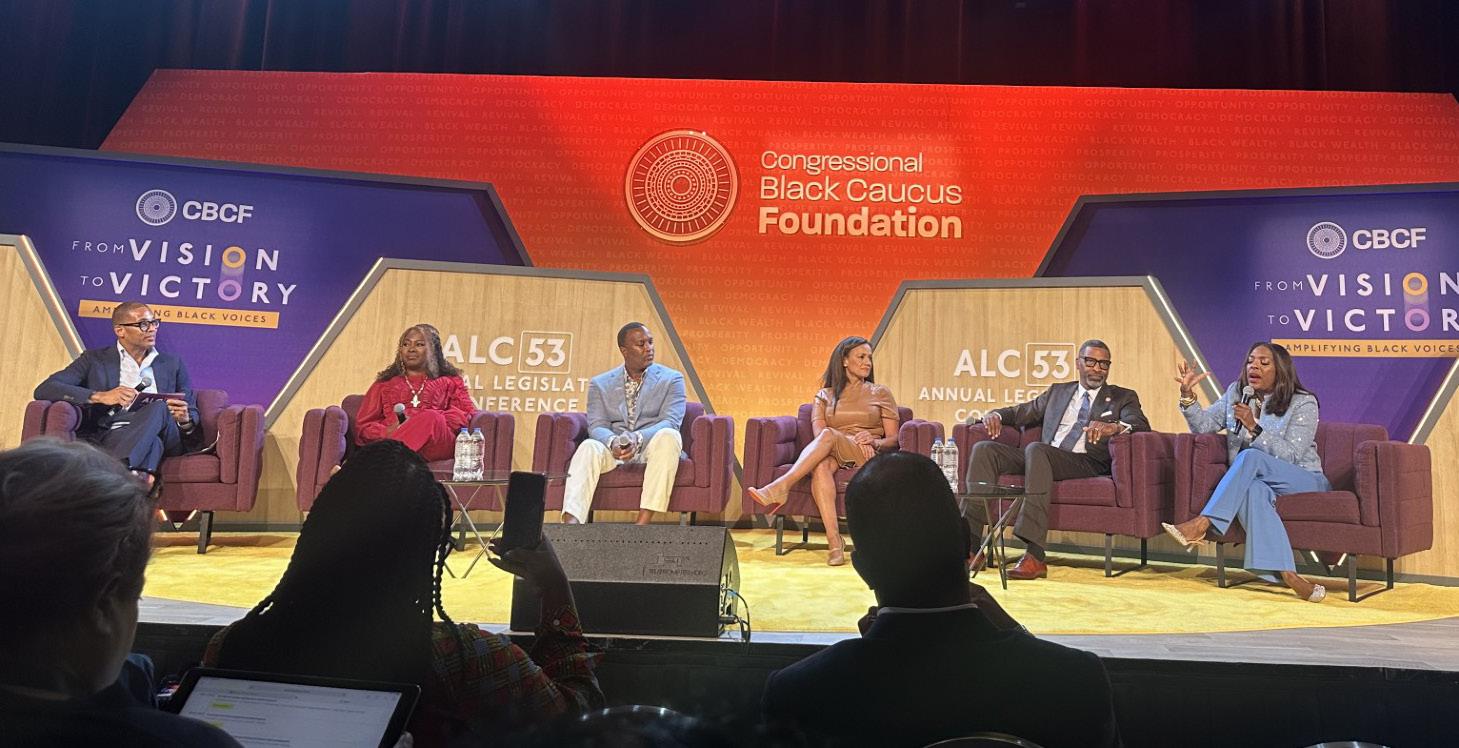
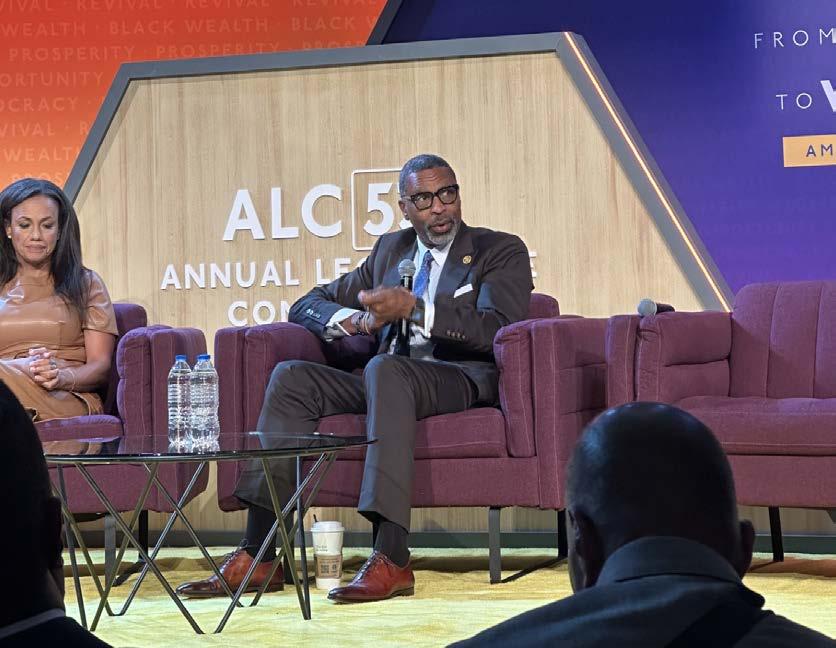
by saying, “Policy matters, but we will not make progress with policy alone. We are going to need every sector of society involved in this conversation,” said Moore.
During the first panel, McAfee received multiple rounds of applause from the crowd during the times that he spoke due to how poignant and powerful his points were. Among the things he said was, “We have to stop being picked on by weak spineless people.” McAfee didn’t use any specific names when he used the phrase “spineless” but the
reaction from what was a large crowd got the point nonetheless.
Project 2025 was one of the topics that was discussed. Brown, who along with Black Voters Matter, has spent time registering voters all over the country and in particular in the South, said Black Americans need to fully understand what Project 2025 is all about.
“We are facing the rollback of voter protections in this country,” Brown said. “It’s really important for us to recognize what is happening.” Brown mentioned the election
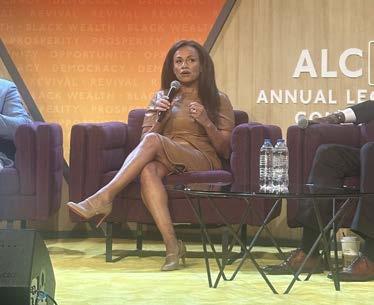
certification laws in Georgia as an example. Among the topics of discussion were Black men and trusting the election process, reproductive health, voting rights and freedoms, housing, environmental justice, and economic justice.
“When people are coming after our communities there has to be consequences,” Brown said about the power of the Black voter block.
The panel closed with Lemon asking NAACP CEO Derrick Johnson how we can continue to advance Black American people in this country. Johnson started by saying, “With work, not rhetoric. Johnson said home ownership was a way to wealth in this country and with private equity firms buying up homes and property, understanding that the system is against us will be a way to fight against it.
“We have to chart out how to get there,” Johnson said.
NABJ panel asks: Where are all the Black male journalists?
BY NOAH WASHINGTON
The train for Peter Street is taking off and Atlanta is getting on.
On Friday, Sept. 6, the grand opening of Atlanta-based artist Miya Bailey's newest gallery, "The Nina Baldwin Gallery" took place.
The opening of the gallery, named after famed writer and musicians James Baldwin and Nina Simone, is simultaneous with the debut of Bailey's newest gallery exhibit, "My My: A Solo Art Exhibition. 100 New York's By Miya Bailey". The exhibit focusing on themes of childhood and adulthood utilized all three of Bailey’s owned locations. Bailey’s three exhibit galleries, collectively displayed approximately 100 pieces of art, all made from him.
Originally from Asheville, North Carolina, Bailey moved to Atlanta seeking a fresh start away from the streets. “I’ve been in Atlanta since 1994, trying to get away from the streets,” he said, noting that his move was about pursuing a safer, more fulfilling path through art.
Bailey’s love for art began early, nurtured by his mother, who encouraged his talent from the time he was a baby. “My mom got me into art when I was really young. She said I was really getting good at it around two or three, so she had me drawing every day,” Bailey recounted. That foundation led to his deep dedication to the craft.
Bailey’s work is currently displayed across multiple galleries, including Peter Street Station’s “Hidden Gallery” (which featured Mike Flo DJing) where Bailey's more affordable pieces for first-time collectors and on the other side "Old Rabbit Gallery," featuring Bailey’s larger, more high-end works aimed at seasoned collectors. These multiple entry points give art lovers and collectors a chance to explore different themes and styles in each location. The Nina Baldwin Gallery is currently located next door to the Old Rabbit Gallery.
“This is to show artists what you can do,” Bailey said, calling others to follow in his footsteps.
She hopes the success of his exhibits inspires other artists to take similar leaps. “I hope other artists with that competitive spirit use this inspiration to do the same thing I just did—open more art galleries owned by artists, put on your people, put on your friends, and activate the spaces,” he urged.
When discussing the theme of the exhibit, Bailey touched on the concept of the "inner child" and the "loss of innocence." His artwork embodies a balance of both joy and stress, reflecting the yin-yang nature of life. “The inner child is about keeping that joy and playfulness inside us, while the loss of innocence is about how the world can

harden us, making us lose that joy," Bailey explained. This balance is a central theme running through his pieces, highlighting the transition from childhood to adulthood and the emotional toll it can take.
Bailey's Business Partner & Chief Curator Plushette Ellis spoke to the ambitious nature of his projects, especially as they relate to the expansion of his galleries. “Miya can paint super fast, and he’s super intentional,” Ellis noted, highlighting Bailey’s work ethic and creative vision. Together, they have worked to preserve the cultural legacy of Atlanta’s Castleberry Hill art district while simultaneously pushing the boundaries of what community-based art can achieve,“To collaborate in facilitating and preserving the culture of Castleberry Hill Art District and Miya’s legacy when it comes to art, philanthropy, and community has been amazing, because those are my mission and values as well,” she added.
Ellis explained that Bailey acquired the space in April and immediately began preparing for the exhibits. “We just hit the ground running. We knew we were going to fill this space for his solo show, and with the opening of Old Rabbit in September last year, it’s just been amazing,” Ellis said. The
opening of Nina Baldwin during Bailey’s solo exhibition was the “cherry on top” of all the hard work.
Frederick Ross III, an attendee of the Baldwin gallery, was particularly struck by the artist’s depictions of black identity. “I’m loving the callbacks to childhood things like the Smurfs, Ernie and Bert, and Garfield. But one thing I really find interesting is his depiction of Black faces,” Ross commented. Ross pointed out that Bailey’s work emphasizes Black features like lips and noses, elements often associated with African heritage.
Ross drew parallels between Bailey’s bold artistic choices and the way Black artists and communities have taken ownership of their representation in media,“White people made it iniquitous, they used it to demean, demote, and degrade Black people. We’re going to take it and turn it into something positive,” Ross said.
Bailey’s work, through its depictions of both innocence and struggle, childhood nostalgia and racial history, creates a dialogue about Black identity in contemporary art. “You depict me in a negative way, but I don’t have to see this as a negative. You knew you wanted Black people in your media, but your
racism wouldn’t allow you to bring us in fully,” Ross explained.
Each gallery has their own unique identity. While Old Rabbit focuses on contemporary works, Nina Baldwin has a specific mission to uplift underrepresented voices in the art world. “Nina Baldwin will focus on women curators and queer artists,” Bailey explained. His goal with this space is to fill the voids he has noticed in the art world, particularly the lack of women-run galleries and spaces dedicated to LGBTQIA+ artists.
On a personal level, Bailey expressed deep satisfaction. "You know what’s important? Seeing my mom, my friends. I don’t see my friends much, so all my friends from back home flew in, and all my friends from all over the place were here," Bailey said, describing the event as a family reunion of sorts. The outpouring of support from loved ones and the Atlanta community left a lasting impression on Bailey. “Atlanta always supports, and I love this city.”
The Nina Baldwin Gallery is located at 309 Peters Street Unit 1, Atlanta GA 30313.
"My My: A Solo Art Exhibition. 100 New Works By Miya Bailey", will be up until November 6, 2024
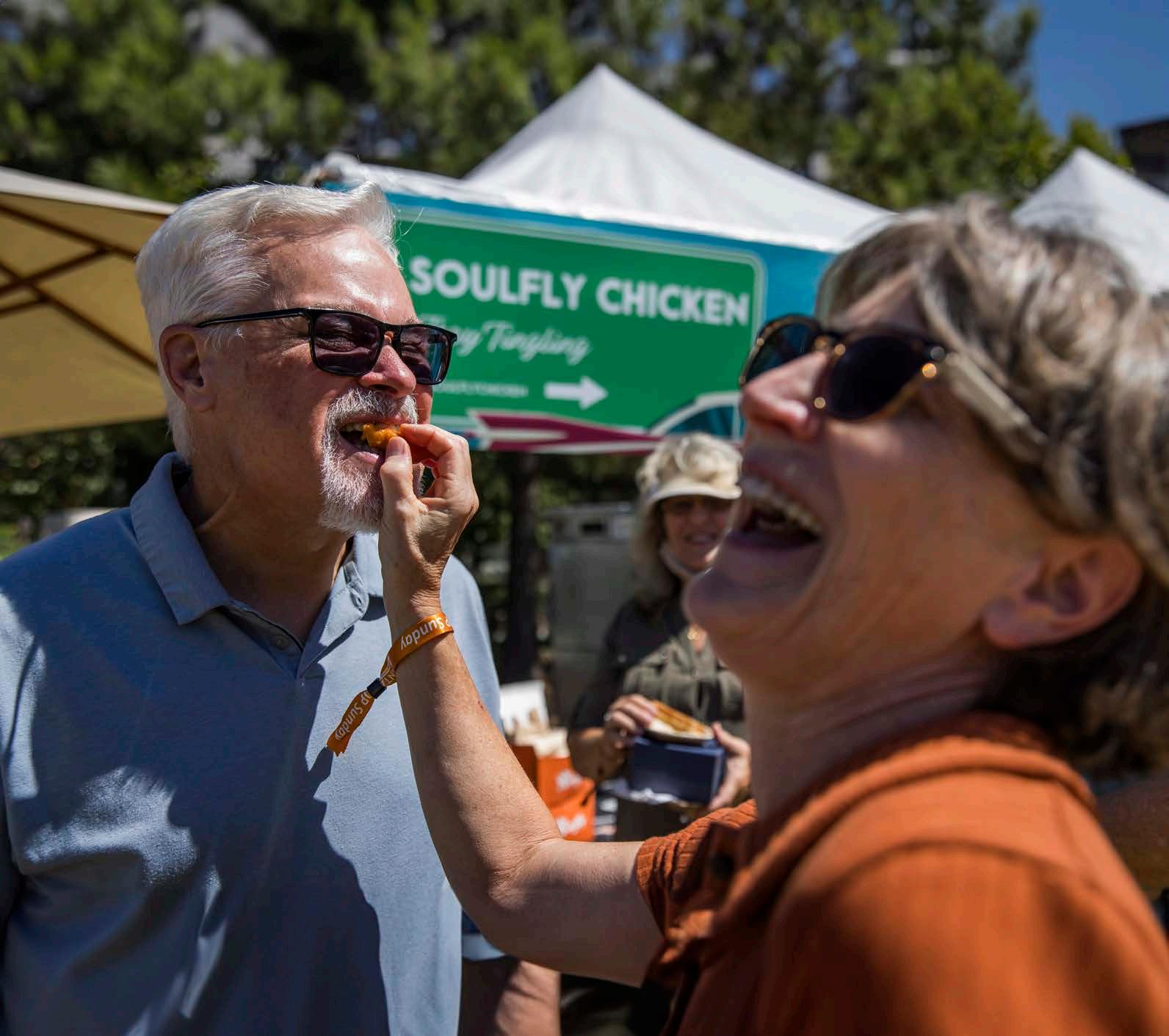
BY DONNELL SUGGS
Anew Atlanta Falcons season brings a new batch of energy to the city's football fans. With the 2024 regular season scheduled to begin on Sunday against the Pittsburgh Steelers, there will be high expectations for new quarterback Kirk Cousins, a veteran defense led by Pro Bowl safety Jessie Bates III, new head coach Raheem Morris, and his staff. There are high expectations for this team.
There are always high expectations for the fan experience at Mercedes-Benz Stadium, rated one of the National Football League's best year after year. According to Falcons personnel, with all season tickets and club seats sold out for the 2024 season, the new additions to how people will enjoy the game begin in the new Gallagher Club and Lounge at Molly B’s and continue with a new menu and the latest releases in the Atlanta Falcons Sundays clothing collection.
On Wednesday, assorted members of the media and local content creators assembled inside the reimagined Gallagher Club and Lounge at Molly B's to try the new menu. The dining options were versatile, ranging from fresh fruit platters and macarons to mushroom pate, grilled branzino, and milked braised pork.
The Gallagher Club and Lounge at Molly B's is part restaurant and part cool club with a killer view of the entire stadium.
"What we are trying to do is constantly diversify our product mix," said Warren Purr, Falcons Vice President of Ticket Sales and Services. "What can we do to add to the fan experience?"
That question can be answered by the many dining options offered, including sushi that will be made fresh every game day.
"This is a well-rounded experience, and there's nothing else like this stadium in the country," said Senior Executive Chef Matt Cooper at the end of the food presentation.
The space, which includes multiple couches, plenty of seating around the bar, and stadium seating in the section, will be split for use during the Falcons and college football season for some reason ticket holders and for Atlanta United and international soccer matches for others.
Those season ticket holders were the reason the new food and drink ideas were put in play, said AMB Sports + Entertainment Senior Vice President of Sales & Service Don Rovak.
"We continued to listen to our season ticket members and related to their feedback," Rovak said during a brief presentation on Wednesday. "When we talk about this space, it's truly unique."



in the
can definitely feel a different
said
who added that the goal of the
was to combine fashion and sports.
"It's a reflection of how much fashion and presentation matters in this
game day for us is a Super
in its own right."
BY KEITH BOYKINS
Here we go again. A handful of rappers, celebrities, and instigators out here are discouraging Black people from voting or trying to convince us that our vote doesn’t matter because both candidates are the same. Don’t believe them.
Every four years, a few vocal people — who rarely, if ever, use their voices to mobilize their followers to engage in specific political action — suddenly crawl out of the woodwork to spread misinformation about the next presidential election.
This year is no different. I thought about posting weekly rebuttals, but rather than spending the next two months debunking these voices over and over again, I want to ask two questions.
First, what’s their strategy to achieve their goals? Assuming you agree with everything they want to do, how do they propose to get it passed through our divided Congress, signed by the President into law, and upheld by a Republican-dominated Supreme Court that now considers any race-specific remedy to be illegal or unconstitutional?
And second, if they had some genius strategy, where were they the last four years when Republican lawmakers and judges:
• blocked the George Floyd Justice in Policing Act
• blocked the John Lewis Voting Rights Act
• ended affirmative action
• halted Black farmers’ relief
• restricted a venture capital fund for Black women
• outlawed minority business grants
• erased Black congressional districts
• banned Black books
• banned Black history classes,
• closed DEI offices,
• refused to indict the officers who killed Breonna Taylor,
• ousted Black lawmakers in Tennessee,
• arrested Black people for voting in Florida, and
• banned civil rights groups in Georgia from providing food and water to people standing in long voting lines?
Many of us have been playing defense without a full bench the last three quarters, and we could have used some help from all the new celebrity players showing up in the fourth quarter who want to change the playbook.
As Malcolm X said, “Show me in the white community where a singer is a white leader.” Yes, celebrities have a valuable supporting role to play, but they don’t get to show up two months before an election, ignore the work of Black thought leaders, and demand a meeting with a presidential candidate like they’re some official spokesman for Black America. So, instead of spending the next eight weeks responding to every lie about Kamala Harris, I propose 10 constructive things we can do to help advance our political agenda well into the future.
1. G et informed. Follow the news. Take a class. Become a critical thinker and more sophisticated consumer of information. I read dozens of news sources every day. You don’t have to read that many, but don’t rely on one source for all your news. Review multiple, credible sources.
2. Verify the information you share. Learn to spot misinformation. And try not to forward fake news. Fact-checkers like Daniel Dale, Snopes.com, Factcheck.org, and Politifact try to debunk misinformation, but sometimes they make mistakes or can’t keep up. That’s why you need to know your sources. Media outlets like Fox News, the New York Post, Newsmax, TownHall, the National Review, and the Wall Street Journal editorial page have a
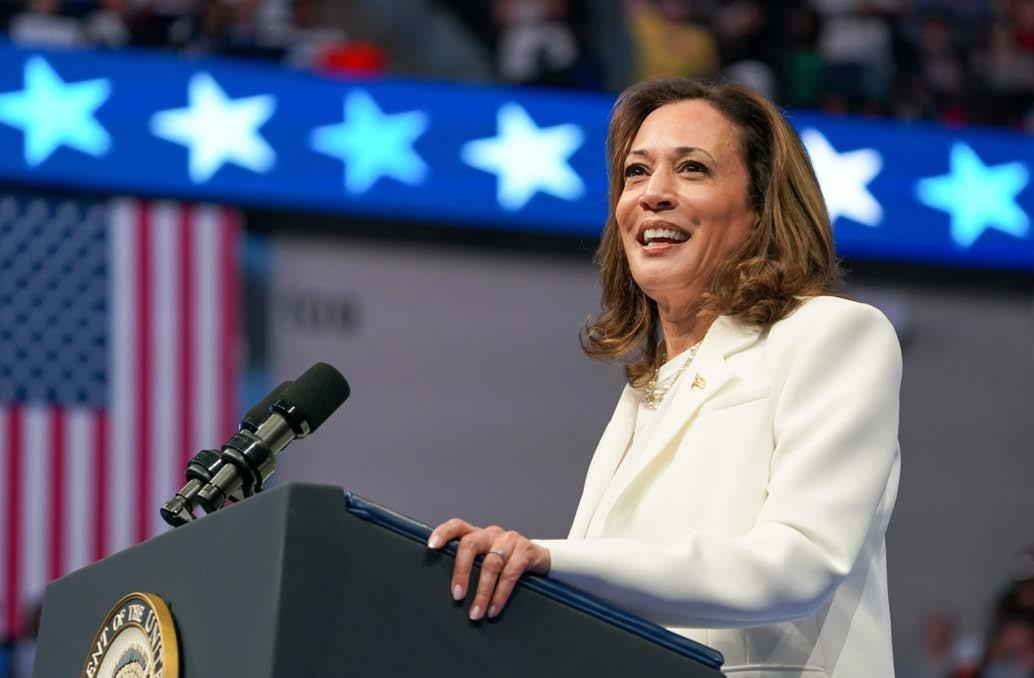
distinct right-wing political bias that favors Trump and the Republicans. Also, rappers, athletes, and celebrities have every right to share their opinions, but they’re not always the most reliable sources for information about government and politics.
3. Vote. Election Day is November 5, but some states require you to register weeks before then. Go to Vote.org today to find the voter registration deadline in your state. If you think you’re already registered, know that Republicans are trying to challenge and purge inactive voters. So check to make sure your name has not been removed from the rolls.
4. Attend local government meetings. Many of the decisions that affect us, including where liquor stores and pollution sites are built and which books are banned in schools, are made at local public meetings that very few people bother to attend. Go there and speak up.
5. Volunteer. Campaigns are always looking for people to make phone calls and knock on doors. Drop by the local campaign office, sign up to host an event, put up yard signs, or become a poll watcher. This is especially important if you live in one of the seven battleground states that will determine the election: Michigan, Wisconsin, Pennsylvania, Georgia, North Carolina, Arizona, and Nevada.
6. Donate. If you’re not invested in the presidential election, find a candidate you do support and contribute to their campaign. This year, we have 435 House members, 34 Senators, 11 governors’ races, nine lieutenant governor seats, 10 attorneys general, seven secretaries of state, and thousands of lower-level offices up for election in November. Unlike the presidential campaign, many of these candidates never get the attention and resources they need to win. Your money could make all the difference.
7. Don’t Reinvent the Wheel. Support organizations that are already doing the work. Groups like Color of Change and the NAACP are developing important policy goals
and working to implement them.
8. Lobby your elected officials. The president can make some critical unilateral decisions for the country, but most government decisions that affect your day-to-day life are made by Congress, your state legislature, your county commissioners, your city council, your zoning board, and your school board. Do you know these officials? Visit their offices. Call them up. Write them letters. Let them know what issues you care about. The phone number for the U.S. Capitol switchboard is (202) 2243121.
9. Run for office. If you’re not satisfied with the people in government, show them how it’s done. Run for school board, town council, state representative, or even Congress. Don’t expect somebody else to do it for you. We are the ones we’ve been waiting for.
10. Start a PAC. This is one of the most difficult tasks on the list, but it can be done. If none of the other steps work for you, you can start your own political action committee to fight for the causes you believe in. You can even create a legislative scorecard to give ratings to members of Congress based on the issues you care about. There are dozens of other constructive things you can do, so don’t be limited by this list. But remember this guiding principle. Cynicism is not a strategy, and apathy is not a solution.
“Black Vote, Black Power,” a collaboration between Keith Boykin and Word In Black, examines the issues, the candidates, and what’s at stake for Black America in the 2024 presidential election.


BY ISAIAH SINGLETON
The 33rd annual AIDS
Walk Atlanta Musical Festival and 5K Run presented by the AIDS Healthcare Foundation (AHF) Pharmacy will be held on Saturday, September 28, from 9 a.m. to 2 p.m. at Piedmont Park (The Meadow, 400 Park Dr. NE, Atlanta).
Multiple award-winning rapper and hip-hop artist Lil’ Kim is using her star power to shine a spotlight on the ongoing fight against HIV/ AIDS.
Lil’ Kim will be the featured headliner at the 33rd annual AIDS Walk Atlanta Music Festival and 5k Run presented by AHF Pharmacy. Multifaceted singer/songwriter and DJ Durand Bernarr will join to kick off the concert event that follows a 5K run/walk through Atlanta’s historic midtown community.
“This annual event offers a time to create a greater awareness of the impact of HIV and AIDS on the local Atlanta community as well as an opportunity to bring together thousands of individuals from across the region to raise critical funds for these 13 worthy organizations,” Dr. Felicia Ivey, AHF Atlanta regional director said. “AHF is proud to present this event as one of the many ways we educate and empower the local community to join the fight

BY NOAH WASHINGTON
On Tuesday, Sept. 3, outside the Richard B. Russell Federal Building in downtown Atlanta, a significant moment in music history unfolded. Judge Thomas Thrash Jr. of the U.S. District Court for the Northern District of Georgia, in a swift and decisive ruling, determined that neither former United States President Donald J. Trump nor his campaign can use the song "Hold On, I'm Coming" without the proper license from the estate of legendary R&B and soul singer Isaac Lee Hayes Jr.
The court ordered Trump to immediately cease all unauthorized use of Hayes' music. The estate, represented by multiple members of his family in court, including his son Isaac Hayes III and his daughter Heather
Hayes, was present during the federal court hearing.
Several members of the Republican Party and affiliate organizations were represented in court including the Republican National Committee (RNC), Donald Trump for President Campaign, The National Rifle Association (NRA), and Turning Point USA, as well as Donald Trump personally. The courtroom was filled with anticipation as Trump’s legal team made their appearance. Although Trump himself was absent, his legal representatives were present to defend the case.
James Walker Jr., representing the Hayes estate, delivered a statement following the ruling. “No one’s ever stood up to Donald Trump like this,” Walker declared. Despite repeated cease-and-desist requests from the estate and notifications from BMI, Trump’s
campaign continued to use Hayes' music at his rallies. "Their theory was to throw something up and hope it sticks," Walker commented on the defense's strategy. "But the judge understood the injunction problem, understood Title 17, and understood copyright. You don't have a license; you can't use the music," Walker stated.
The atmosphere in the courtroom was tense, cited Heather Hayes, the daughter of Isaac Hayes, who reflected on the significance of this ruling. The decision not only sets a precedent for the protection of artists' intellectual property but also marks a significant victory for the Hayes family, who have fought tirelessly to restore the rights that Isaac Hayes lost during his lifetime. “I just think it means that we can finally stand up for our father in ways that he was unable to
against HIV and AIDS.”
AHF, the world’s largest nonprofit HIV/AIDS healthcare organization, hosts AIDS Walk Atlanta Music Festival and 5k Run, raising more than $1 million yearly for 13 Atlanta-based HIV/AIDS service organizations. Past AIDS Walk Atlanta artists have included Ashanti, Myá, Chris “Ludacris” Bridges, Monica, Sevyn Streeter, Wale, and Trina.
This is Lil’ Kim’s second time has joined AHF to educate audiences about the fight against HIV/AIDS. In 2021, she headlined AHF’s Florida AIDS Walk and Music Festival in Fort Lauderdale.
AWA’s 2024 helping organizations include the following:
· AHF
· A Vision For Hope
· ANIZ
· AID Atlanta
· Bridge of Light
· Center for Black Women’s Wellness
· Georgia Equality
· Georgia Harm Reduction
· I Am Human Foundation
· Lost N Found Youth
· Positive Impact Health Centers
· Thrive Support Services
· Trans Women Of Color Healing Project
To register for the event, create a team, or join a team, visitaidswalkatlanta.org.
do when he was here. He lost his rights to a lot of his publishing for 56 years, and now we can stand up for him when he can no longer do it for himself. A lot of other artists need to understand that you have rights as a creator, that people can’t use your music or your IP without a license, and then you can say yes or no. It’s your right to be able to say yes or no, so it’s important. It’s a win. We’re happy,” Hayes exclusively told The Atlanta Voice.
The next steps in the legal process will involve determining the restitution owed to the Hayes estate, a matter that will be addressed in a forthcoming trial.
The initial copyright infringement was filed on August 11, 2024, with no immediate response. However, at Trump’s subsequent rally on Wednesday, August 14, in Asheville, North Carolina; none of Hayes' music was used before, during, or after the event, according to The Atlanta Voice editor-in-chief Donnell Suggs.


Sealed proposals for 24RFP1319236B-PS - Wireless Communication and Devices for the Fulton County Information Technology Department, will be accepted by the Fulton County Department of Purchasing & Contract Compliance, electronically through Bidnet Direct at https://www.bidnetdirect.com/georgia/ fultoncounty, on Wednesday, October 2, 2024, no later than 11:00 a.m. local (Eastern) time on the stated date.
Proposers names will be publicly read at 11:05 a.m. on the stated due date via Zoom.
Proposal Bond: N/A
Scope of Work: Fulton County, Georgia (“County”) To provide mobile equipment, supplies, cellular network (Standard/Public Safety), in- building coverage and support for wireless voice and data services. Given the critical nature of County services to include but not limited to Public safety, Health and Human Services, it is imperative that the Service Provider ensures limited interruptions in service, even during the transition from the County’s current wireless provider.
In order to obtain complete information about this solicitation, please go to the link below where this document and supporting documents can be downloaded, https://www.bidnetdirect.com/georgia/fultoncounty.
Fee: N/A
Term of Contract: The “Commencement Term” of

this Agreement shall begin on the date of execution of the Agreement in the year 2025, January 1, the starting date, and shall end absolutely and without further obligation on the part of the County on the 31 day of December 2025 with two (2) renewal options.
A Pre-Proposal Conference will be held on Wednesday September 18, 2024, at 11:00 a.m., local time, via Zoom to provide bidders with information regarding the project and to address any questions.
Link: https://zoom.us/s/97319701893?pwd=KOwwPntAbaH7VtaHuUkpn0DZ9a7RnT.1
Meeting ID: 973 1970 1893
Passcode: 589182
One tap mobile
+14703812552,,97319701893#,,,,*589182# US (Atlanta) +14702509358,,97319701893#,,,,*589182# US (Atlanta)
If you have any questions regarding this project please contact Phyllis Stewart, Assistant Purchasing Agent at Email: phyllis.stewart@fultoncountyga.gov or phone 404-612-4215.
Fulton County reserves the right to accept or reject any or all proposals and to waive technicalities.
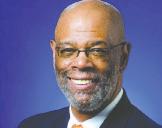
RFP for Residences at Chosewood Park located at 1211 McDonald Drive SE, Atlanta, GA.
BIDS DUE: September 26, 2024, at 2:00 pm PRE-BID MEETING will be held on site on September 4, 2024, at 10:00 am.
PLANS: Hard Copies of plans available upon request and at subcontractor’s expense from A1 BluePrint (www.a1blue. com), Phone: 404-524-8881 OR for a link contact Linda at Lstache@gormanusa.com. Contact Info: Linda Stache, Gorman & Company, Phone: 608-835-5177
CERTIFICATIONS: SBE/MBE/ WBE/EBE/DBE/VBE, SECTION 3 and a prevailing wage rate project. This project is also NGBS Bronze and +45L ZERH Credits

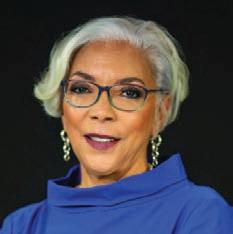

















these 10 HBCU students drive the summer internship of a lifetime with Black-owned newspapers
